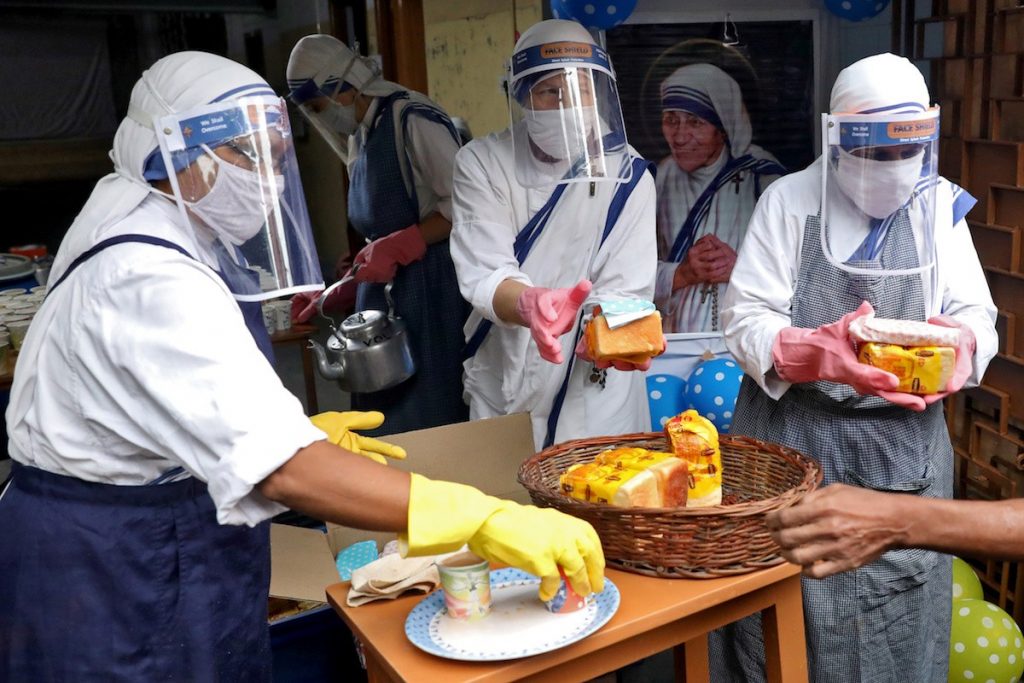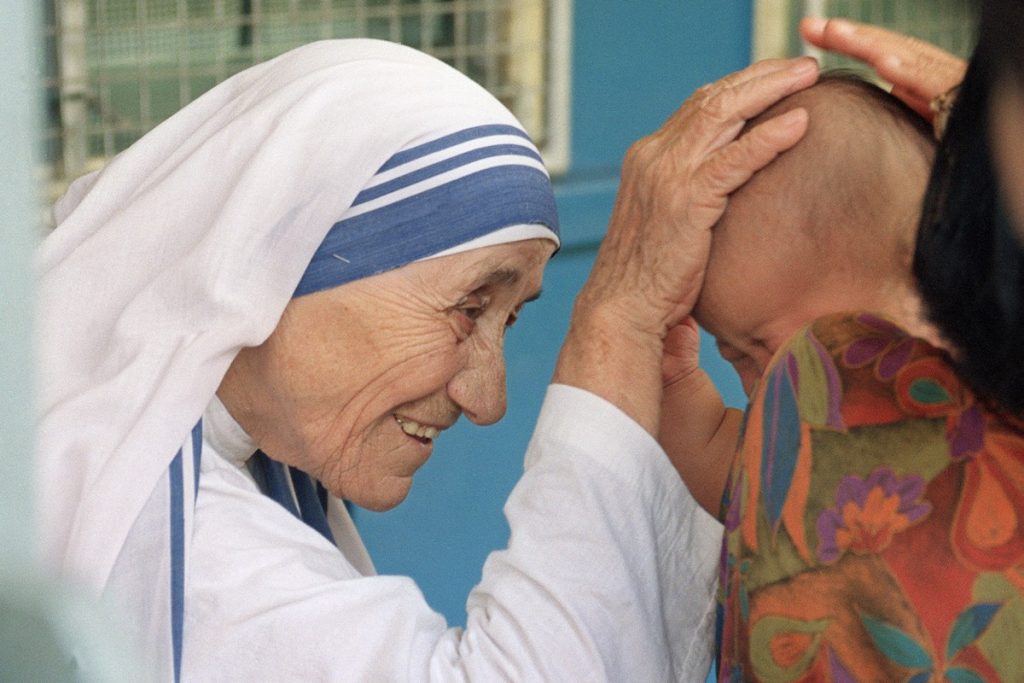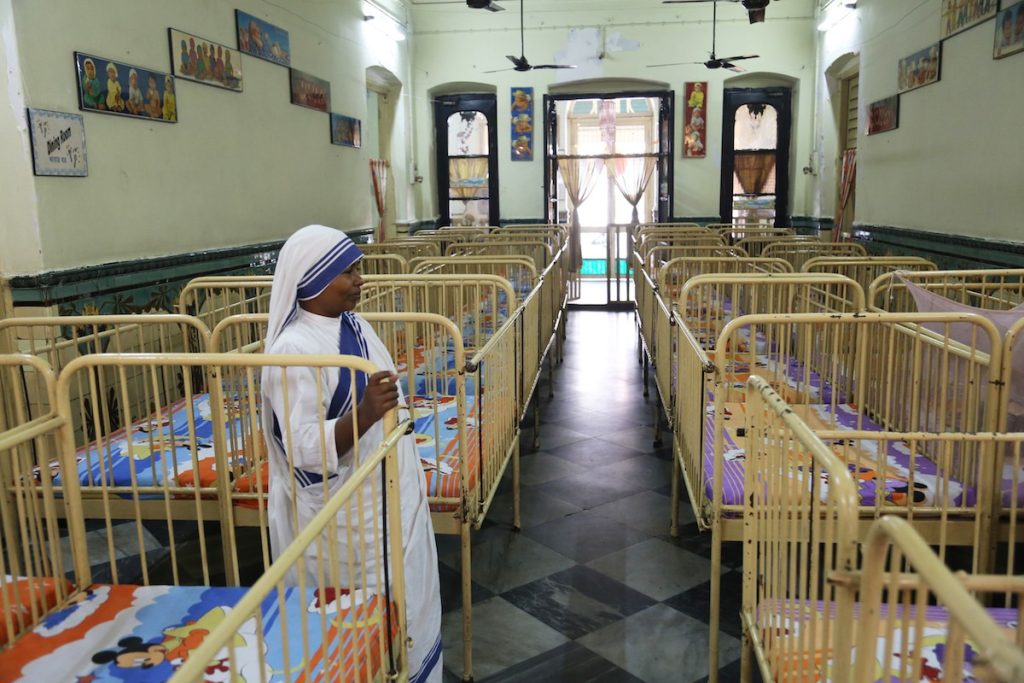
Supporters of Mother Teresa’s Missionaries of Charity reacted with surprise and concern to the Indian government’s ruling that the organization is now ineligible for foreign donations, but a spokeswoman for the Calcutta-based branch of the organization believes the situation will be remedied without much effect on the missionaries’ work.
India’s Ministry of Home Affairs made a determination on Christmas Day that the Missionaries of Charity no longer met eligibility requirements under the Foreign Contributions Regulation Act, the Wall Street Journal reports.
In a Dec. 27 announcement, the ministry said that during the renewal of the organization’s application, they found “adverse inputs.” The authorities did not specify what this meant.
Sister Prema, superior general of the Missionaries of Charity, said Dec. 27 that the community’s renewal application under Indian law had not been approved. The organization has asked its centers not to use any foreign contribution accounts “until the matter is resolved.”
Sunita Kumar, a spokeswoman for the Missionaries of Charity in Calcutta, told the New York Times she was confident the problem could be resolved. She indicated that funding for the missionaries’ work would not be affected immediately due to local support.
“There’s enough locally also that’s given, so we can handle that,” she said.
Some media reports erroneously indicated that the Missionaries of Charity financial accounts had been frozen.
Foreign donations to the Missionaries of Charity made up more than US$13 million for the financial year ending in March 2021, its filings said. The organization does not publicly report its total income, according to the New York Times.
Father Dominic Gomes, vicar general of the Archdiocese of Calcutta, called the announcement “a cruel Christmas gift to the poorest of the poor.”
The Albanian-born Mother Teresa of Calcutta was a Sister of Loretto and a high school teacher who left the Sisters to work in the slums of India. She taught poor children and treated the sick in their homes. Some of her former high school students joined her, and together they took in men, women, and children who were dying in the gutters along the streets.
She founded her first community of women religious called the Missionaries of Charity in 1950, under the Archdiocese of Calcutta. The government granted the missionaries a house to serve Calcutta’s poor in 1952. The organization now has hundreds of houses worldwide and its membership includes religious sisters and brothers and priests, plus a lay organization.

Mother Teresa became world famous for her work. She died in September 1997 and Pope Francis canonized her in 2016 as St. Teresa of Calcutta.
Sam Brownback, who served as U.S. Ambassador-at-Large for International Religious Freedom from 2018 to 2020, criticized the refusal to renew the missionaries’ application.
It was “unbelievable” that the Indian government would “ban foreign donations to an organization founded by Nobel Peace Prize recipient Mother Teresa,” Brownback said on Twitter Dec. 27. “This misguided action only hurts the people of India. Charities should be allowed to help people in need.”
Bishop M. Jagjivan, moderator of the National Christian Council, told the Wall Street Journal that there has been increasing harassment of Christians. Foreign funding for Christian groups and institutions no longer has routine approval.
“They are thinking that opposing Christianity is patriotism. This is not a healthy atmosphere,” said Jagjivan, whose organization is an umbrella group for various Christians. Its mission includes the fostering of inter-religious harmony.
India’s national government and many state governments are headed by members of the Bharatiya Janata Party, which promotes a nationalist vision of Hinduism.
Eight Indian states have passed purported anti-conversion laws. Some critics of Christianity and other minority religions in India make allegations of forced conversion or proselytism, inducing conversion through fear, bribery, or the superstitious use of healing prayers.
Christian critics tend to question whether this alleged misconduct takes place on a scale that would require a law. They also worry that the claims are used to portray all Christians in a bad light.
Police in Gujarat, a western state of India, are investigating a complaint that girls at a Missionaries of Charity-run shelter home were forced to read the Bible and wear a cross.
Kumar, the spokeswoman for the Missionaries of Charity in Calcutta, rejected that allegation.
“I’ve worked here for 45 years, and nothing like that has ever happened,” she told the New York Times.

Vigilante extremist Hindu groups engaged in protests, church disruptions, harassment and vandalism around Christmas Day 2021. Some smashed statues of Jesus or burned effigies of Santa Claus or accused Christians of using Christmas gifts and festivities to induce or force Hindus to convert, The Guardian reports.
The Indian government has also increased its scrutiny of foreign funding for other non-profit organizations. In 2020 Amnesty International shut down its Indian operations after various government actions, including the freezing of its bank accounts. The government charged that Amnesty International avoided regulations about foreign entities that receive donations from outside the country.
Mamata Banerjee, West Bengal’s chief minister, expressed shock at the treatment of the Missionaries of Charity.
“While the law is paramount, humanitarian efforts must not be compromised,” said Banerjee, who worried that the move would affect some 22,000 patients and employees, the Times of India reports.
Shashi Tharoor, a Member of Parliament from Kerala state who is a member of the Indian National Congress opposition party, said the government’s action was “shocking.”
“When Mother Teresa wins a Nobel Prize, India rejoices. When her organization serves the poor and destitute, the government cuts off their funding,” Tharoor said, according to the New York Times.
Figures from the 2011 census indicate that some 79.8% of India’s 1.38 billion population is Hindu, 14.2% Muslim, and 2.3% Christian. There are about 20 million Catholics in India.
In 2020, for the first time in more than a decade, the U.S. Commission on International Religious Freedom listed India as a “country of particular concern” for religious freedom.
Christians in India were the targets of 305 violent incidents in the past nine months, according to an October 2021 report from United Against Hate, the Association for Protection of Civil Rights, and the United Christian Forum
India, the world’s second-most populous country after China, is ranked 10th on the World Watch List for the persecution of Christians compiled by the advocacy group Open Doors.
Source: Licas Philippines
0 Comments